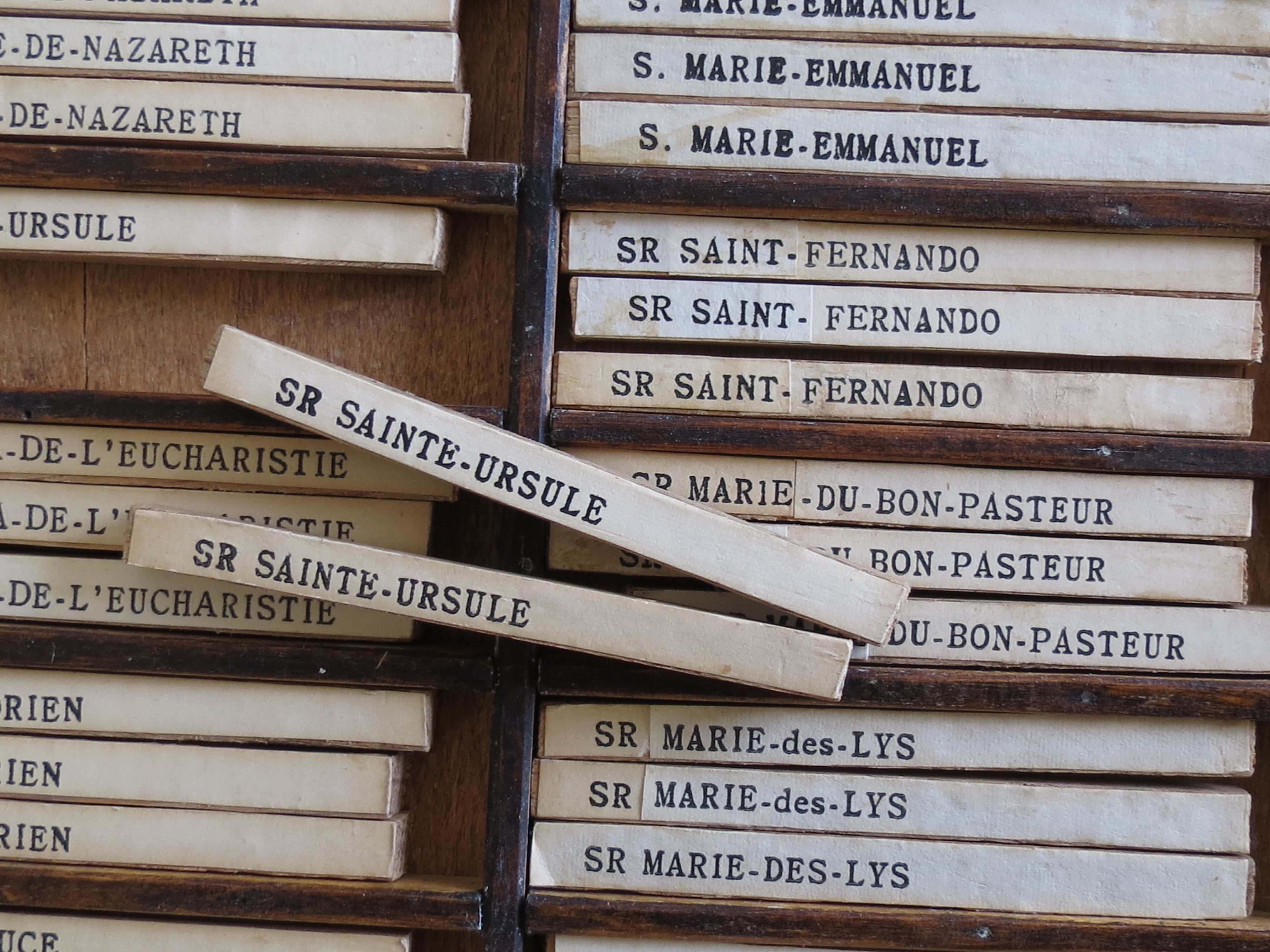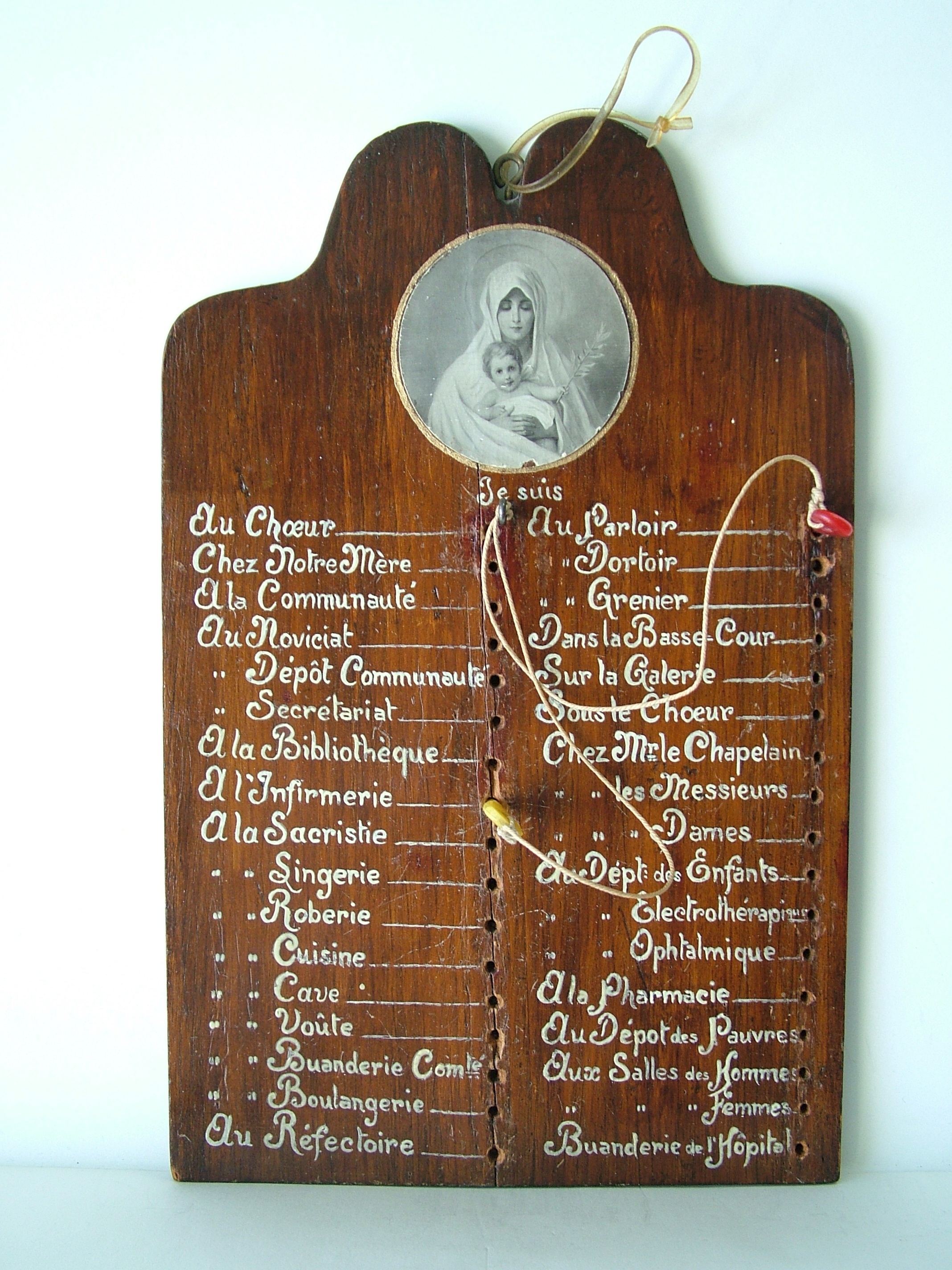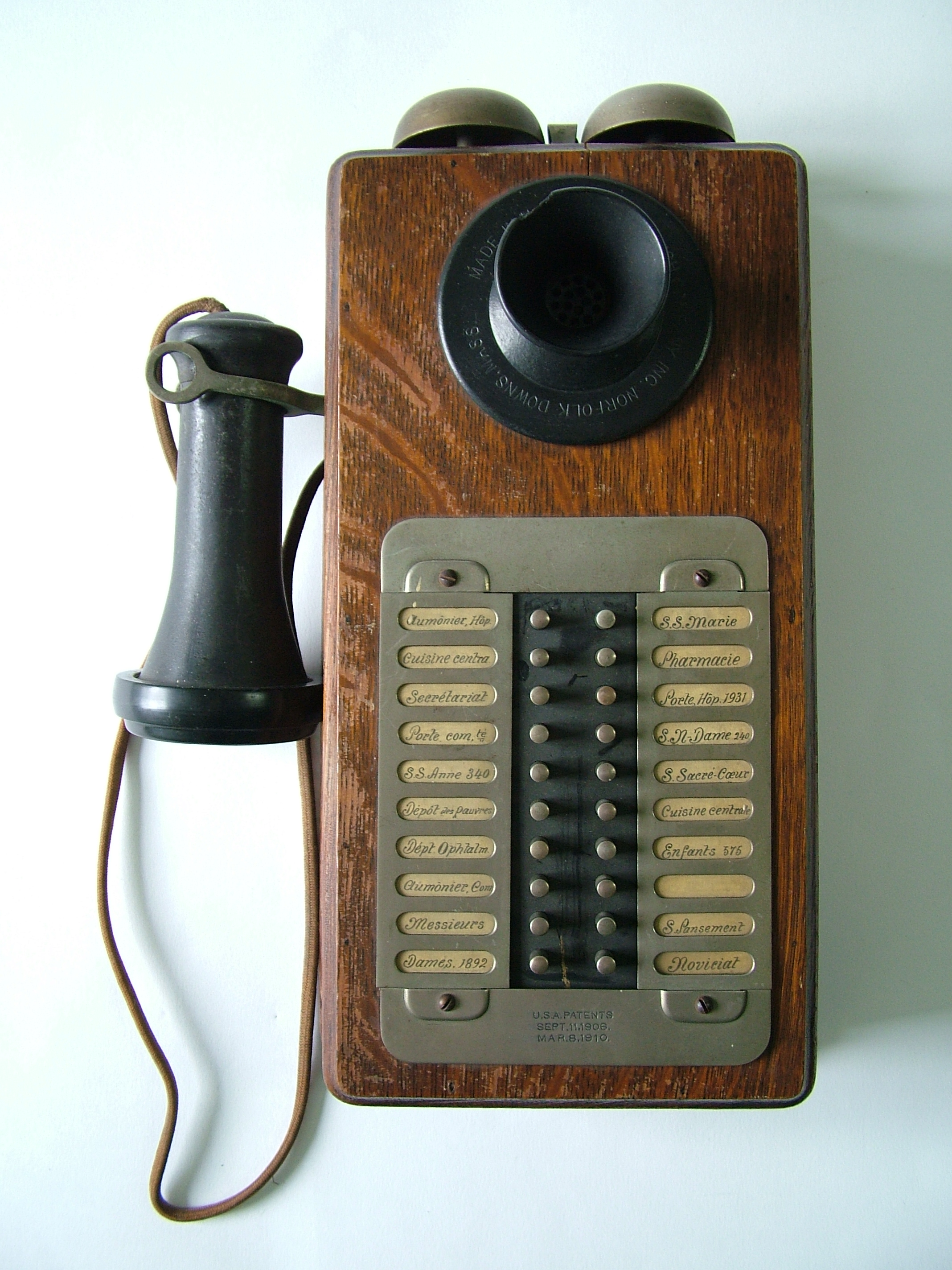Methods of Communications in the Monastery-hospital
Nowadays, it seems almost impossible to imagine daily life without telecommunications technology, as it is part of our leisure and work. Let’s look at some of the media used over the years by the Augustinians.
Location table and functions charts
The Augustinians lead a busy life, punctuated by religious observances, hospital work[1] and their various duties. Location tables were in the monastery and the hospital to prevent them from wasting time looking around the buildings. The identification sticks displayed the nuns’ names and were placed in the location table and functions charts.

© Collections de l’Hôtel-Dieu de Québec
Another location table in the Hôtel-Dieu de Québec was used to locate the Mother Superior’s assistant. She could place a plastic marker on it to indicate where she was heading in the monastery or the hospital.

© Collections du Monastère des Augustines, Hôtel-Dieu de Québec.
From the acoustic pipe to the cellphone
In the Annales de l’Hôtel-Dieu de Québec de 1877 à 1888, dated December 15, 1885, various improvements were reported to communicate effectively on the side of the hospital: “Finally, the Sisters’ corner has been laid with an acoustic pipe, which enables hospitallers of the two Salles du Précieux to speak to each other without going up or down.”[2][3]
In 1888, Dr. Michael-Joseph Ahern, a surgeon at the Hôtel-Dieu de Québec, strongly suggested that the Augustinians acquire a telephone to facilitate communication between doctors and sisters. The phone was installed in March 1888. The community would not regret this decision as evidenced by the following excerpt:
“We now enjoy the immense benefits of the telephone. […] It works perfectly; and thus night and day, we can communicate in live voice with our doctors, who on their side give us their prescriptions, without having to come to the hospital outside of their normal daily visiting hours. This improvement will cost us twenty-four dollars a year. Dr. Ahern urged us, and we now understand how right he was to insist on this point.”[4][5]
At the Hôpital général de Québec, the telephone’s arrival was followed by a warning from Monseigneur Marois:
“In order to administer the community affairs more expeditiously, Mr. Notary LaRue proposed to have the telephone installed at his expense. […] Here is the advice given by Monseigneur Marois on this subject: That the telephone be used exclusively for business, that there be no talking on it without the Superior’s authorization, and that those who are requested to use it for some particular case be accompanied by one of their sisters.”[6][7]
Did Monseigneur Marois fear that the nuns would “make themselves at home” and use it beyond the basic needs? He would be very surprised to learn that today, telecommunications technology is alive and well in the lives of the Augustinians. For example, before the restoration work at the Hôtel-Dieu de Québec monastery (2013 to 2015), the Augustinians had a TeleVox system (as in some educational institutions). Speakers were placed in most of the halls of the monastery and when they received a call, the receptionist called them on the TeleVox. The nuns could go to the handset to answer. Today, cellphones facilitate contact with the nuns. In fact, some of them have mobile phones, which they use in the course of their duties or to receive personal calls.

© Collections du Monastère des Augustines, Hôtel-Dieu de Québec.
***
Today, the Monastère des Augustines is a haven of peace and wellness in the heart of Old Québec. During their stay, guests are invited to unplug from their digital devices. In 2018, employees of the Monastère knitted woollen pouches so that these guests could store away their cell phones.
[1] Although most have retired from the hospital system, some still work as nurses. Others continue to provide a spiritual presence in the hospital.
[2] Marie-Rose Coulombe de St-Raymond, Les Annales de l’Hôtel-Dieu de Québec de 1877 à 1888, Volume 3, p. 449.
[3] « Enfin, on a posé dans le coin des religieuses un tuyau acoustique, qui permet aux hospitalières des deux Salles du Précieux Sang de se parler sans monter ni descendre »
[4] Cité par François Rousseau, La Croix et le Scalpel, Histoire des Augustines et de l’Hôtel-Dieu de Québec. Tome I : 1639-1892, Québec, Les éditions du Septentrion, 1989, p. 248.
[5] « Nous jouissons maintenant des immenses avantages que procure le téléphone. […] Il fonctionne à merveille; et ainsi la nuit comme le jour, nous pouvons communiquer de vive voix avec Messieurs nos Médecins, qui de leur côté nous donnent leurs prescriptions, sans être obligés de se rendre à l’hôpital, en dehors des heures fixées pour leur visite quotidienne. Cette amélioration nous coûtera vingt-quatre piastres par année. Monsieur le Docteur Ahern nous la demandait instamment, et nous comprenons aujourd’hui combien il avait raison d’insister sur ce point »
[6] Excerpt from Annales de l’Hôpital général de Québec, January 26, 1899.
[7] « Dans le but d’administrer plus promptement les affaires de la Com[munauté] Mr. le notaire LaRue avait proposé de faire installer le téléphone à ses frais. […] Voici les conseils que donne Mgr Marois à ce sujet : Que Dans le but d’administrer plus promptement les affaires de la Com[munauté] Mr. le notaire LaRue avait proposé de faire installer le téléphone à ses frais. […] Voici les conseils que donne Mgr Marois à ce sujet : Que le téléphone soit utilisé exclusivement pour les affaires, qu’il ne s’y fasse aucun parloir sans l’autorisation de la Supérieure, et que celles qui seraient demandées pour quelque affaire particulière, soient accompagnées d’une de leurs sœurs. le téléphone soit utilisé exclusivement pour les affaires, qu’il ne s’y fasse aucun parloir sans l’autorisation de la Supérieure, et que celles qui seraient demandées pour quelque affaire particulière, soient accompagnées d’une de leurs sœurs. »

